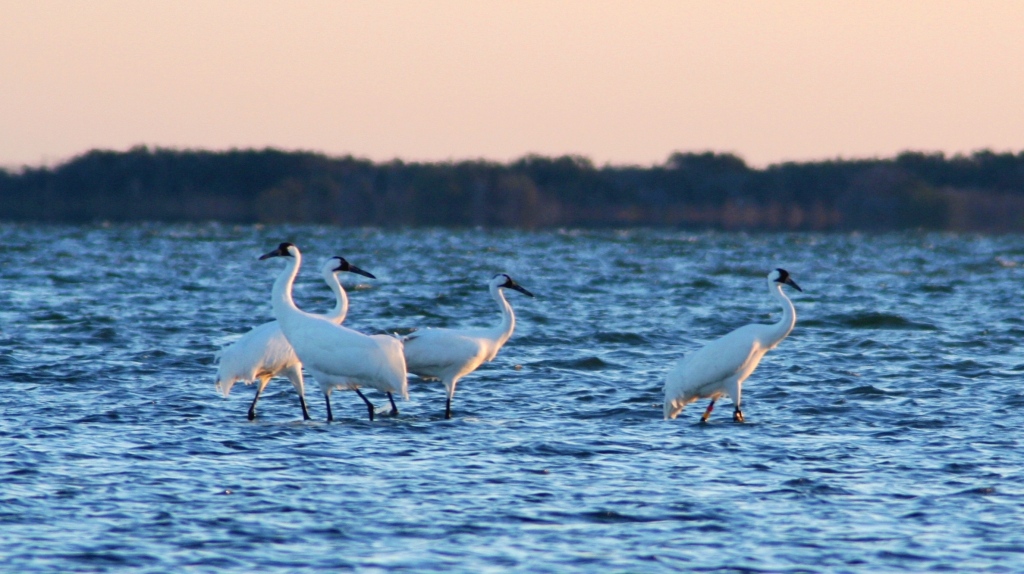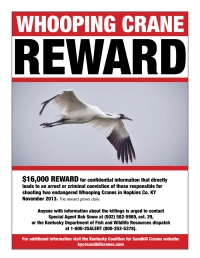
Photo by Brett Hartl / Center for Biological Diversity
The Louisiana Department of Wildlife and Fisheries (LDWF) and the U.S. Fish and Wildlife Service (USFWS) are looking for leads regarding the shooting death of an endangered juvenile Whooping Crane found dead January 9, 2024 in an agricultural pond on the south side of Besi Lane in Mamou, Evangeline Parish, Louisiana. A necropsy determined that the crane had been shot, which resulted in a fractured spine and internal hemorrhaging.
A total of $20,000 is now being offered by various organizations for information leading to the arrest and conviction of the person or persons responsible for the illegal killing of this Whooping Crane. The reward includes the USFWS offering up to $5,000, the Louisiana Wildlife and Fisheries Foundation up to $2,500, the International Crane Foundation up to $2,500, and the Dallas Zoo up to $2,500, and $10,000 from the Center for Biological Diversity. While the Louisiana flock is designated as a non-essential, experimental population it is protected under state law, the Endangered Species Act, and the Migratory Bird Treaty Act.
USFWS, LDWF and other state agencies began Louisiana’s reintroduction of Whooping Cranes in 2011 when a cohort of 10 juveniles were released at White Lake. The first chick hatched by the reintroduced cranes took place in 2016. In an effort to reintroduce the birds to the crane’s historic range, 167 Whooping Cranes have been released in Louisiana with 11 of those cranes known to have been killed by poachers. The Louisiana population is currently estimated to be 85 Whooping Cranes. This reintroduced population marked the first presence of Whooping Cranes in the wild in Louisiana since 1950. The juvenile crane killed had been raised in a captive breeding program at the Dallas Zoo and was released in Louisiana in November 2023.
“It’s frustrating,” Richard Dunn, a curator at Freeport McMoran Audubon Species Survival Center, told The Advocate. “It’s bad enough to hear a bird got predated or hit a power line. Something as simple as it got shot is what kills us the most.” The Survival Center, based in New Orleans, has worked to improve the Whooping Crane population by breeding and raising cranes to be reintroduced into the wild. State officials and groups like the Audubon Nature Institute have gone to great lengths to reintroduce the species. Each bird reintroduced into the wild takes months of care, and nearly $33,000 is spent caring per bird, Dunn said.
North America’s tallest bird, a male Whooping Cranes stands nearly 5 feet tall, with a wingspan of 7 feet. Their 5-foot-long coiled trachea allows the birds to give a loud single-note call, which is likely the origin of their name. The species can live 28 years in the wild, and mated pairs remain bonded for life. Whooping Cranes only occur in North America and of the 15 crane species found worldwide, are considered the most endangered.
Historically there were thought to be thousands (exact number unknown) of Whooping Cranes populating North America, but widespread loss of habitat for agriculture, and unregulated hunting caused their numbers to plummet to 15 birds by the 1940s. Listed as critically endangered, Whooping Cranes are slowly making a comeback. Today there are approximately 800 Whooping Cranes in Texas, Louisiana and Florida. This number includes the only remaining wild population in the world – one that migrates between breeding grounds in Wood Buffalo National Park, Alberta, Canada and wintering grounds at Aransas National Wildlife Refuge and along coastal Texas; the reintroduced non-migratory population in Louisiana; the Eastern Migratory Population; several cranes remaining in Florida from an earlier attempt at reintroduction there, as well as individuals in captive breeding programs in Canada and North America.
Anyone with information about the shooting of the Whooping Crane should contact the U.S. Fish and Wildlife Service at (985) 882-3756 or the Louisiana Department of Wildlife and Fisheries Lake Charles Office at (337) 491-2588. Callers can remain anonymous if they choose.






